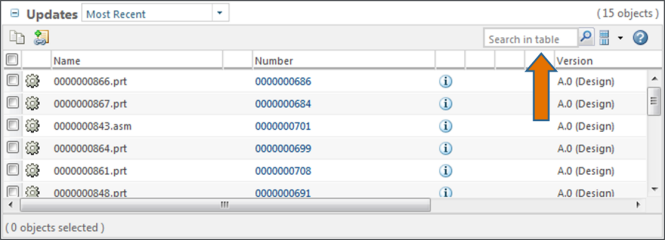Searching Within Tables
The Search in table field appears on most tables throughout Windchill:
This search field does not perform a typical Windchill search. Instead, it filters the table rows using the information that is visible in the table columns.
The following rules apply when searching within tables:
• You are only filtering the data that is currently visible in the table. If you hide a table column, the table search is not applied to the values contained in the hidden column.
• The question mark character (?) is processed as a literal character instead of a wildcard.
• If you include spaces within your search terms, the spaces are considered literally.
• The order of the strings within a value is considered. For example, searching for part design does not return an object with the value “design part.”
• You can use an asterisk wildcard (*) to substitute for characters within a string and for spaces between strings. For example, a search for 123*78 would return results for “12345678” and “1234 5 678.”
• The asterisk wildcard (*) used at the beginning or ending of a single search string is unnecessary and does not change the filtering behavior.
• If you include multiple strings separated by spaces, then the placement of the asterisk wildcard (*) is considered. For more information, see the examples below.
| For simplicity, the following examples use only the object name. However, table searches filter all visible column data. For example, if the table includes a State column and you search for w, then all objects that are in the In Work state are returned. |
For example, consider a table with the following objects:
Engine.asm |
Spotlight 023 |
material weight specs |
Design Guide |
Part 890 |
You perform the following table searches. Highlighted rows indicate the objects that would appear in your search results:
• Search in table: g (or g* or *g)
Engine.asm |
Spotlight 023 |
material weight specs |
Design Guide |
Part 890 |
All objects with the letter ‘g’ in their names are returned, regardless of whether the ‘g’ appears at the beginning, middle, or end of a string.
• Search in table: ig (or ig* or *ig)
Engine.asm |
Spotlight 023 |
material weight specs |
Design Guide |
Part 890 |
Even though “Engine.asm” has both a ‘g’ and an ‘i,’ the characters you enter in the search field are not processed on an individual basis unless you include a space between them.
• Search in table: i g (or i g* or *i g)
Engine.asm |
Spotlight 023 |
material weight specs |
Design Guide |
Part 890 |
No objects are returned. The search includes a space between ‘g’ and ‘i,’ and therefore Windchill considers each a standalone string:
◦ i g—Windchill filters for two one-character strings (for example, “Part I G 890”).
◦ i g*—Windchill filters for a one-character string (‘i’) followed by another string that begins with ‘g’ (for example, “Part I G890”).
◦ *i g—Windchill filters for a string that ends with an ‘i’ followed by another string with one character (for example,“Part 890I G”).
• Search in table: ight (or ight* or *ight)
Engine.asm |
Spotlight 023 |
material weight specs |
Design Guide |
Part 890 |
• Search in table: light (or light* or *light)
Engine.asm |
Spotlight 023 |
material weight specs |
Design Guide |
Part 890 |
• Search in table: lght (or lght* or *lght)
Engine.asm |
Spotlight 023 |
material weight specs |
Design Guide |
Part 890 |
• Search in table: l*ght
Engine.asm |
Spotlight 023 |
material weight specs |
Design Guide |
Part 890 |
When used in the middle of a search string, the asterisk wildcard character (*) can substitute for one or more characters, including spaces between strings.

